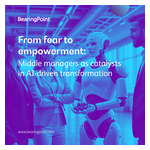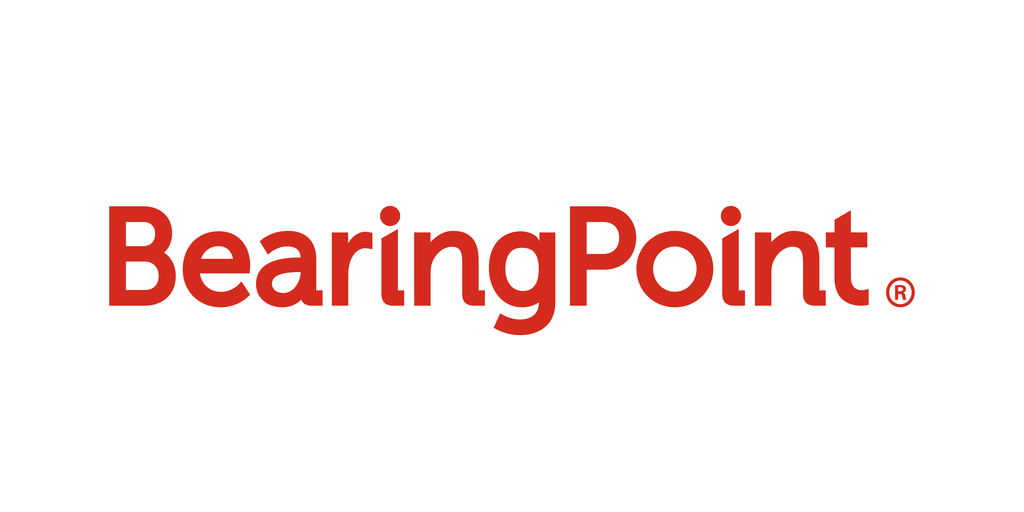Middle managers are the key to AI-driven transformation
BearingPoint study highlights how enabling middle managers is critical for organizations to unlock AI’s full potential.
AMSTERDAM–(BUSINESS WIRE)–#AI–AI is transforming the way businesses operate, but successful adoption isn’t just about technology – it’s about people. Management and technology consultancy BearingPoint’s latest study, “From fear to empowerment: Middle managers as catalysts in AI-driven transformation”, reveals that middle managers are at the heart of successful AI-driven transformations, playing a critical role in bridging the gap between leadership vision and real-world execution.
Yet, many organizations underestimate the importance of middle managers when rolling out AI initiatives. BearingPoint’s AI-driven transformation practices study shows that employees fear AI’s impact on individual roles, making it difficult for them to see it as an enabler. To counter such AI transformation challenges, organizations must empower middle managers to navigate AI integration effectively.
“AI-driven transformation requires a mindset shift at all levels. Organizations must equip middle managers with the right tools and support to ensure AI adoption delivers real value,” said Rémy Sergent, Partner and Global Leader People & Strategy at BearingPoint. “Organizations that invest in AI literacy, structured change management, and leadership development can turn AI-driven transformation into a sustainable advantage.”
The critical role of middle managers in AI adoption
BearingPoint highlights four key areas where middle managers can drive successful AI adoption.
1. Strategic workforce planning
AI will reshape job roles and responsibilities, and middle managers are best positioned to provide HR and senior leadership with insights into future talent needs, skills development, and organizational changes. Without strategic workforce planning, organizations risk employee resistance, inefficiencies, and lost productivity.
2. Reverse mentoring
Younger employees, as digital natives, are already comfortable with AI. Reverse mentoring programs help middle managers balance their business expertise with the AI proficiency of younger colleagues, fostering a culture of collaboration.
According to the study, AI adoption is highest among younger employees but lacks strategic alignment. By combining the agility of younger employees with the leadership experience of middle managers, organizations create a culture of innovation and ensure AI is applied effectively within business processes.
3. Promoting AI literacy and reducing fear
AI training shouldn’t just focus on tools – it should build understanding, reduce uncertainty, and promote responsible usage. Middle managers play a key role in making AI approachable and relevant for their teams.
The study highlights that AI literacy is not just about technical training. Organizations must also address the “black box effect” by providing insights into the technology, as well as clear insights into how AI works, its ethical use, and its limitations. Without transparency, employees are less likely to trust AI-driven decisions. Finally, it is about explaining the importance of data and how to value it properly to enhance it and leverage it.
4. Shifting focus to higher-value tasks
As AI takes over repetitive work, it frees up managers to focus on strategy, leadership, and employee development. However, this shift only happens when middle managers are empowered to rethink their roles. According to BearingPoint’s study, 43% of standard managerial tasks are estimated to be impacted by GenAI. Approximately 19% of these jobs are augmented, and 24% are automated by GenAI.
Even though 68% of organizations surveyed reported that AI has led to efficiency gains, without clear guidance, middle managers struggle to allocate freed-up time to higher-value activities like strategic planning, talent development, and cross-functional collaboration.
The need for a clear strategy
According to the study, 64% of companies already provide some form of AI training, yet only 35% have structured change management programs in place to support AI adoption at scale. BearingPoint sees this as a major gap because, without proper support, AI implementation risks stalling or creating resistance among employees. A structured approach helps middle managers navigate transformations effectively.
AI will reshape leadership, not replace it
The role of middle managers is evolving, and according to BearingPoint, they are becoming the drivers of AI adoption, ensuring that AI is integrated effectively and ethically, which benefits both employees and the business.
The study emphasizes that AI will not eliminate leadership roles but redefine them. Middle managers will be expected to act as change agents and foster adaptability and collaboration. Companies that invest in their middle managers’ AI capabilities will be better positioned to create a workforce that embraces AI rather than fears it.
“Critics claim AI-driven automation and flatter hierarchies reduce the need for intermediaries. However, AI does not replace leadership; it redefines it. Middle managers act as the bridge between leadership and employees, ensuring successful AI adoption,” said Marine Laufer-Tourte, Partner and expert for change management at BearingPoint.
With the right investment in AI literacy, change management, and leadership development, organizations can turn AI into a powerful enabler of growth and a competitive advantage. These organizations enhance human potential rather than replace it.
About the study
The study is based on a survey that was conducted among over 300 managers in Europe and the US in March 2025. Additionally, it is based on an analysis of 58 job descriptions representing approximately 1,000 middle managers across various companies to understand better how AI impacts their routine managerial tasks.
The study is available at https://www.bearingpoint.com/en/insights-events/insights/from-fear-to-empowerment-middle-managers-as-catalysts-in-ai-driven-transformation/.
About BearingPoint
BearingPoint is an independent management and technology consultancy with European roots and a global reach. The company operates in three business units: Consulting, Products, and Capital. Consulting covers the advisory business with a clear focus on selected business areas. Products provides IP-driven digital assets and managed services for business-critical processes. Capital delivers M&A and transaction services.
BearingPoint’s clients include many of the world’s leading companies and organizations. The firm has a global consulting network with more than 10,000 people and supports clients in over 70 countries, engaging with them to achieve measurable and sustainable success.
BearingPoint is a certified B Corporation, meeting high standards of social and environmental impact.
Homepage: www.bearingpoint.com
LinkedIn: www.linkedin.com/company/bearingpoint
Contacts
Press contact
Alexander Bock
Global Senior Manager Communications
Telephone: +49 89 540338029
alexander.bock@bearingpoint.com
Thank you for donating to DutchNews.nl.
We could not provide the Dutch News service, and keep it free of charge, without the generous support of our readers. Your donations allow us to report on issues you tell us matter, and provide you with a summary of the most important Dutch news each day.
Make a donation


